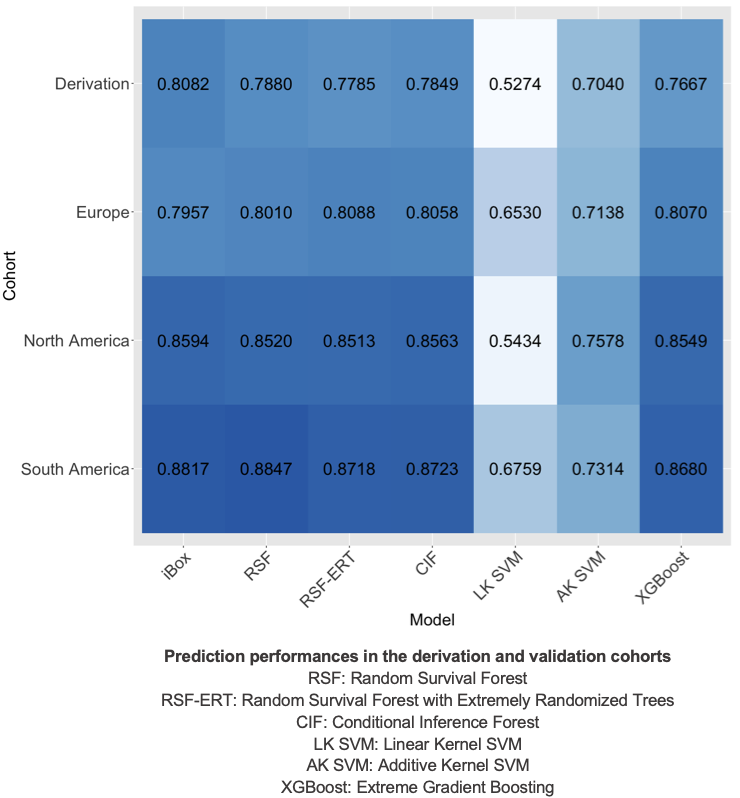Predicting Long Term Kidney-Allograft Failure: Machine Learning vs Traditional Statistical Models
A. Truchot1, M. Raynaud1, c. lefaucheur2, O. Aubert1, A. Loupy1
1Paris Transplant Group, Paris, France, 2Hôpital Saint-Louis, Paris, France
Meeting: 2022 American Transplant Congress
Abstract number: 538
Keywords: Graft failure, Graft survival, Kidney transplantation, Prediction models
Topic: Clinical Science » Organ Inclusive » 72 - Machine Learning, Artificial Intelligence and Social Media in Transplantation
Session Information
Session Name: Machine Learning, Artificial Intelligence and Social Media in Transplantation
Session Type: Rapid Fire Oral Abstract
Date: Tuesday, June 7, 2022
Session Time: 5:30pm-7:00pm
 Presentation Time: 6:00pm-6:10pm
Presentation Time: 6:00pm-6:10pm
Location: Hynes Room 210
*Purpose: Prognostic models have been developed in organ transplant over the past years using traditional statistical models. However, whether these are outperformed by machine learning (ML) approaches has not been established. To address this question, we developed several machine learning algorithms and compared their predictive capability to the one achieved by the iBox prognostication system based on standard Cox method.
*Methods: We used a validated derivation cohort of 4,000 consecutive kidney recipients prospectively recruited in 4 centers in France, and 3 validation cohorts from Europe (n=2,846 patients), North America (n=1,537), and South America (n=671). A total of 24 parameters including the time of risk evaluation and clinical, histopathological, immunological and functional characteristics were used to develop 6 machine learning models including tree-based models (RSF, RSF-ERT, CIF), survival support vector machine (LK SVM, AK SVM) and gradient boosting (XGBoost). Their respective prediction performances were assessed with discrimination (C-index), calibration and Brier scores and were compared to those of the iBox system.
*Results: Among the 9,054 kidney recipients included, 1,165 (12.87%) lost their graft after a follow-up time post-transplant of 5.20 years (IQR 3.22-7.00). The time from transplant to risk evaluation was 0.98 years (IQR: 0.27-1.07). The derivation cohort was split into a training and a test set and was used to develop the ML models. The validation cohorts were used for external validation of the models. ML based C-index at 7 years post risk evaluation in the derivation cohort were 0.788, 0.779, 0.785, 0.527, 0.704 and 0.767 for RSF, RSF-ERT, CIF, LK SVM, AK SVM and XGBoost respectively, compared with 0.808 for the iBox (Figure). In the external validation cohorts, the best performing ML models achieved a C-index of 0.809 (RSF-ERT), 0.856 (CIF) and 0.885 (RSF) in Europe, North America and South America respectively, in the similar range of iBox (C-index of 0.796, 0.859, and 0.882 respectively). ML models achieved satisfactory calibration in the derivation and validation cohorts. Overall, the iBox system achieved the best performances illustrated by lower Brier score compared with ML based models.
*Conclusions: This study shows that traditional statistical models show higher performances than the ones achieved by machine learning for predicting long term allograft outcome. Given the increase use and hype around ML, this study supports the use of traditional statistical approaches for prognostication in organ transplantation.
To cite this abstract in AMA style:
Truchot A, Raynaud M, lefaucheur c, Aubert O, Loupy A. Predicting Long Term Kidney-Allograft Failure: Machine Learning vs Traditional Statistical Models [abstract]. Am J Transplant. 2022; 22 (suppl 3). https://atcmeetingabstracts.com/abstract/predicting-long-term-kidney-allograft-failure-machine-learning-vs-traditional-statistical-models/. Accessed February 26, 2026.« Back to 2022 American Transplant Congress

